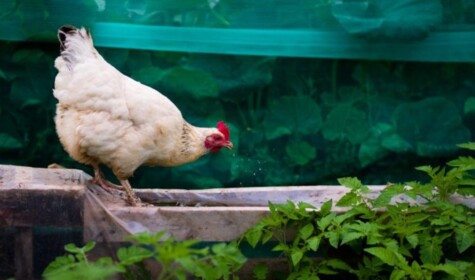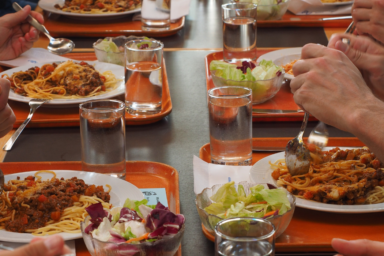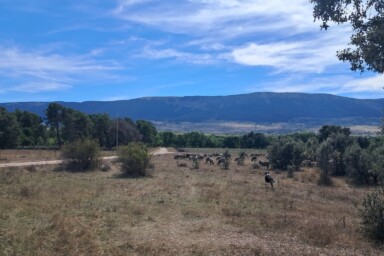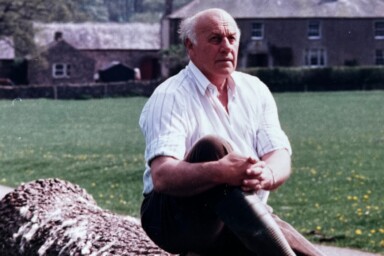Amid the current Covid-19 crisis, the need for a resilient and localised food system has never been clearer. Demand for locally grown fresh produce has rocketed, and we need to look at how we can increase production. Bringing more new entrants into farming is essential, but to do this these farmers need access to land, training and business support, allowing them to create strong and viable businesses. Growing growers could increase the supply of agroecologically grown fruit and vegetables in the UK and increasing the number of new farmers more broadly could help make us more resilient in the face of future crises.
Faced with high land prices and insecure tenancies, a lack of appropriate training courses and the difficulty of finding and managing viable and appropriate routes to market, the challenges facing new farmers is a perfect storm.
One model that is seeking to address these issues is that of the ‘farmstart’. Farmstarts, or incubator farms as they’re often known, provide a test-bed and training ground for new entrants, allowing ‘farmstarters’, to gain the required skills and test out their business ideas before taking the plunge and setting up their own independent farming operation. This de-risks the process for farmstarters and supports them in the transition to running a sustainable and viable farming business.
Each farmstart site addresses the barriers differently, depending on the local situation and needs of the new entrants – some provide small plots of land for independent growing, others focus on the training needs of farmstarters – but to be defined as a farmstart, they should be aiming to provide protected access to land, training and markets. Many of these operations are also embedded within organisations that are working to address the systems change needed alongside this practical support.
The history of the farmstart
The oldest incubator farms in North America were started almost 30 years ago to support the establishment of new farms, and there are now more than 100 incubator farms spread across the continent, supported by a national network that provides training and technical assistance to the incubators. The model spread to France in 2007 and the country now has 45 operational incubators, with around a further 30 currently in development. The French incubator farms, supported by the national RENETA network, are based around the legal status of an ‘incubatee’ who undertakes a trial period of farming, accessing free training and grant finance under this status, that is delivered by incubator sites.
The first formal UK farmstart was launched in 2013 by the Kindling Trust in Manchester. ‘It came out of our work trying to create a fairer food system,’ Helen Woodcock explains. ‘We’d set up a co-op of buyers and growers to help our existing growers get a fair price for their produce, but then found there weren’t enough existing organic growers locally, and the people who were interested in starting a career in organic growing faced so many challenges.’ The model has spread and there are currently four formal farmstart sites in operation in the UK, with several others in development as well as a number of informal incubators in operation. ‘We wanted to create progression opportunities for people on our accredited horticulture courses who wanted to develop livelihoods in commercial organic growing,’ explains Brian Kelly from OrganicLea who have a farmstart site in London. ‘Also, there was and still is, a need to expand our supply chain, and creating more local producers has been a way to do this.’
Access to land
With land prices more than trebling since 2003, buying land is out of reach for many, and it can be difficult to get security of tenure on rented land. Most farmstart sites provide land access by renting or buying a large piece of land and splitting it up into small plots which they then rent to the new entrants. Depending on the site, skill level of the farmers and land availability, these plots can vary in size. In the urban setting of Manchester, the Kindling Trust start people on an eighth or quarter of an acre of land, allowing people to grow their plot as they progress through the programme. In contrast, Tamar Grow Local in Cornwall have a strong relationship with a local landowner in a rural setting, and as a result are able to offer one acre plots (depending on experience), with additional land available if needed.
Land access in livestock operations presents an additional challenge as significant amounts of land are required. Stream Farm in Somerset brings in new entrants under a ‘share farming’ agreement, allowing the farmers to run one of the enterprises on the land with the income split between the farmer and the owners of Stream Farm. The 250-acre organic farm includes a beef herd, sheep, meat chickens, eggs, apple juice and trout, with a common infrastructure and shared route to market providing key support for each individual enterprise.
Access to training
The Kindling Trust found that when they started their first farmstart site at Abbey Leys, many participants were lacking in the practical skills needed to grow veg on a commercial scale and struggled to set up a successful business as a result. Learning from this, they introduced a second farmstart model on their Woodbank site, based around providing people with the skills they need to run a market garden by growing alongside an experienced grower, as well as receiving additional classroom training in business and finance skills. Nick Gould joined their farmstart in January 2019: ‘I’d had an allotment for about 15 years. In recent years, it had been at the back of my mind – could I do this for a living or at least a part-living? Being part of the farmstart has given me the confidence to start my own growing project. I realise that there is still a lot to learn, but I feel I now know what those gaps are.’ He has now rented a half acre site from an existing organic farm and is busy planning crops for his first season.
OrganicLea in London have put training at the heart of their operation, running an assortment of theoretical and practical City and Guilds Horticulture courses that reach a broad audience across the city. The people participating in their farmstart have generally already completed a level 2 qualification before progressing onto the farmstart traineeship, and over the course of nine months, they progress from growing alongside existing OrganicLea growers, to establishing their own independent plot with mentoring support. ‘At first it felt a little overwhelming, standing alone in the centre of an allotment, surrounded by council houses on a site full of weeds, black plastic, brambles, mud and a bent-up digging fork from the previous user,’ admits one of their farmstart participants Daniel O’Sullivan. ‘But the growing has so far been a wonderful experience. l have loved every moment and challenge so far, and I would encourage anyone to get involved.’
The accredited training that OrganicLea offers has been identified as a key aspect of the farmstart model that can hopefully be replicated on other sites across the country.
Access to market
With the rise of Community Supported Agriculture projects and box schemes, many new entrants pursue direct to customer sales as their route to market, but the additional time, admin and logistics that marketing, deliveries and managing sales require can be a real burden on a new operation. Tamar Grow Local have several established routes to market that their Farmstarters can sell into, including a weekly online Food Hub and wholesale operation. As well as providing a high percentage of the sale price to the producer, this allows the new farmers to focus on establishing their business without also having to identify their market. Similarly, OrganicLea encourage the new entrants to sell into their salad and veg operation, and the Kindling Trust provides avenues through their Manchester Veg People and Veg Box People operations.
Progression
Farmstart operations often require the new entrants to move on from the site after a period of time, usually around 3-5 years. This is especially true of sites where land access is limited in order to permit a new intake of people to take part in the scheme. However, this will really depend on land availability and the experience level of participants; for example, the original Kindling Trust Abbey Leys site permitted people to stay on the land for five years, but Tamar Grow Local do not require people to move on from the site, as they have access to a large amount of land and they feel it encourages tenants to think long-term about their businesses.
The future of the farmstart
Running farmstart operations has not been without challenges. “Organisationally, the challenge is how to give enough priority to our farmstart project at times when we don’t have direct funding for it,” Brian from OrganicLea explains. So far, their programme has been funded by charitable trusts that understand the vision of the scheme, but ongoing funding is a challenge. Most existing sites have embedded the farmstart model within wider organisations that can help support some of the overhead costs, and as it’s still a very new model in this country, there is a lot to learn about how to run a farmstart site effectively.
To help with this, Tamar Grow Local, Kindling Trust and OrganicLea joined together in 2019 to found the Farmstart Network, which is managed by the Landworkers’ Alliance. Aiming to support existing and new farmstarts, as well as share knowledge and tackle some strategic issues to support the model, the network has so far organised their first exchange visit to an existing site and produced a handbook to help new farmstarts to set up.
So why do we need more farmstarts? With the Fruit and Veg Alliance saying that we need to produce at least an extra two million tonnes more fruit and veg a year in the UK, and a rapidly ageing farming population, we need to support new entrants into the field. ‘We need farmstarts all over the UK to help new growers and farmers,’ Helen Woodcock explains, ‘and the network is a key part of this – it’s a way to help other groups learn from our mistakes and successes, and for us all to solve challenges and share ideas together.’







